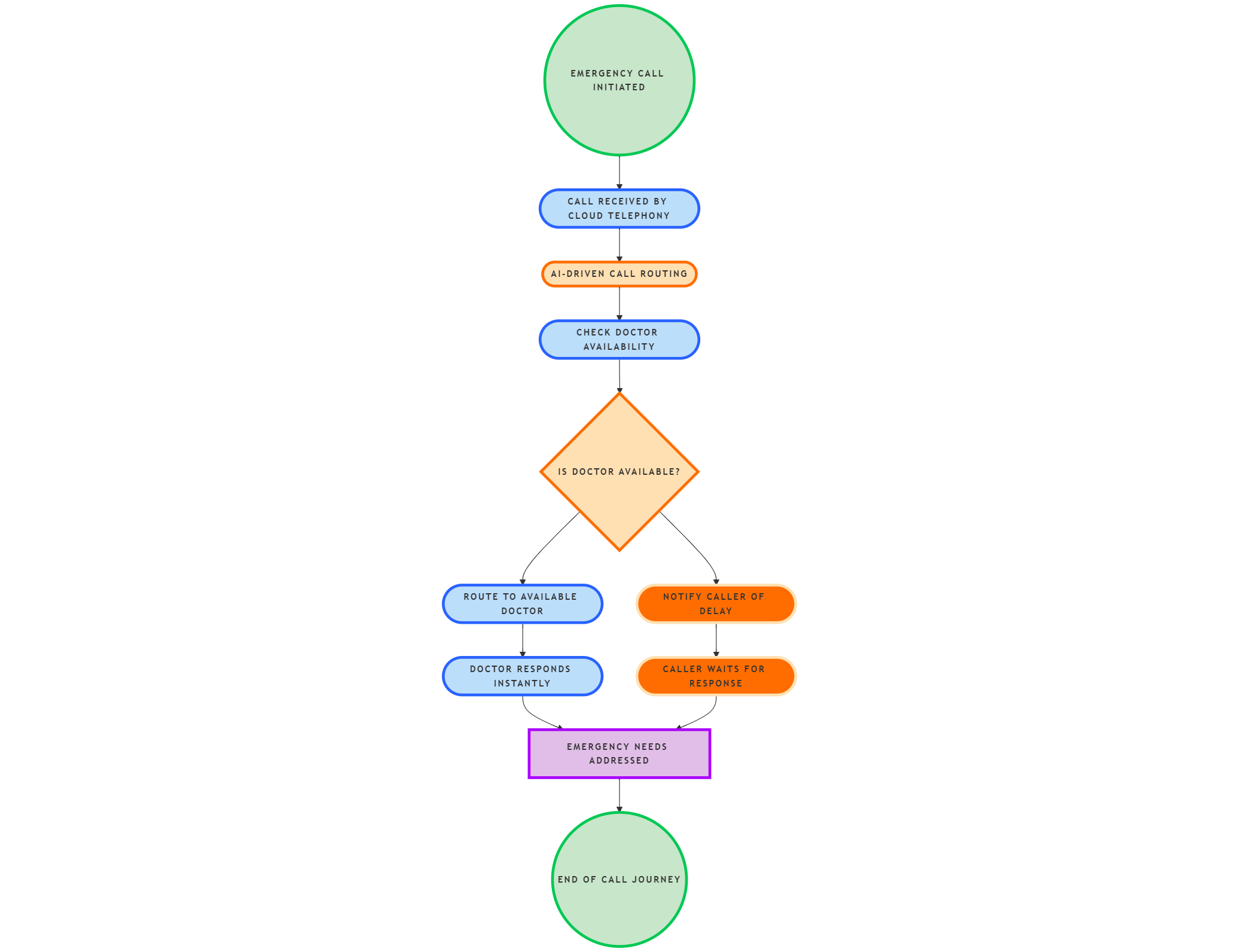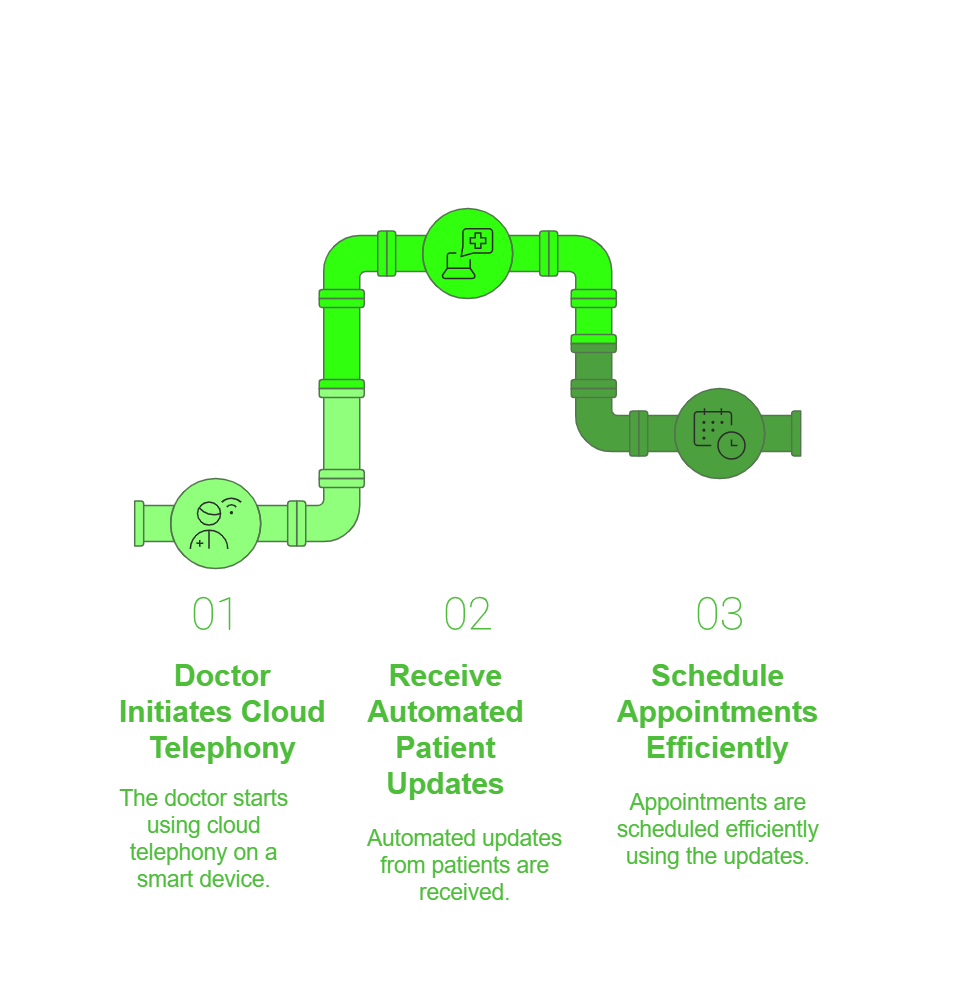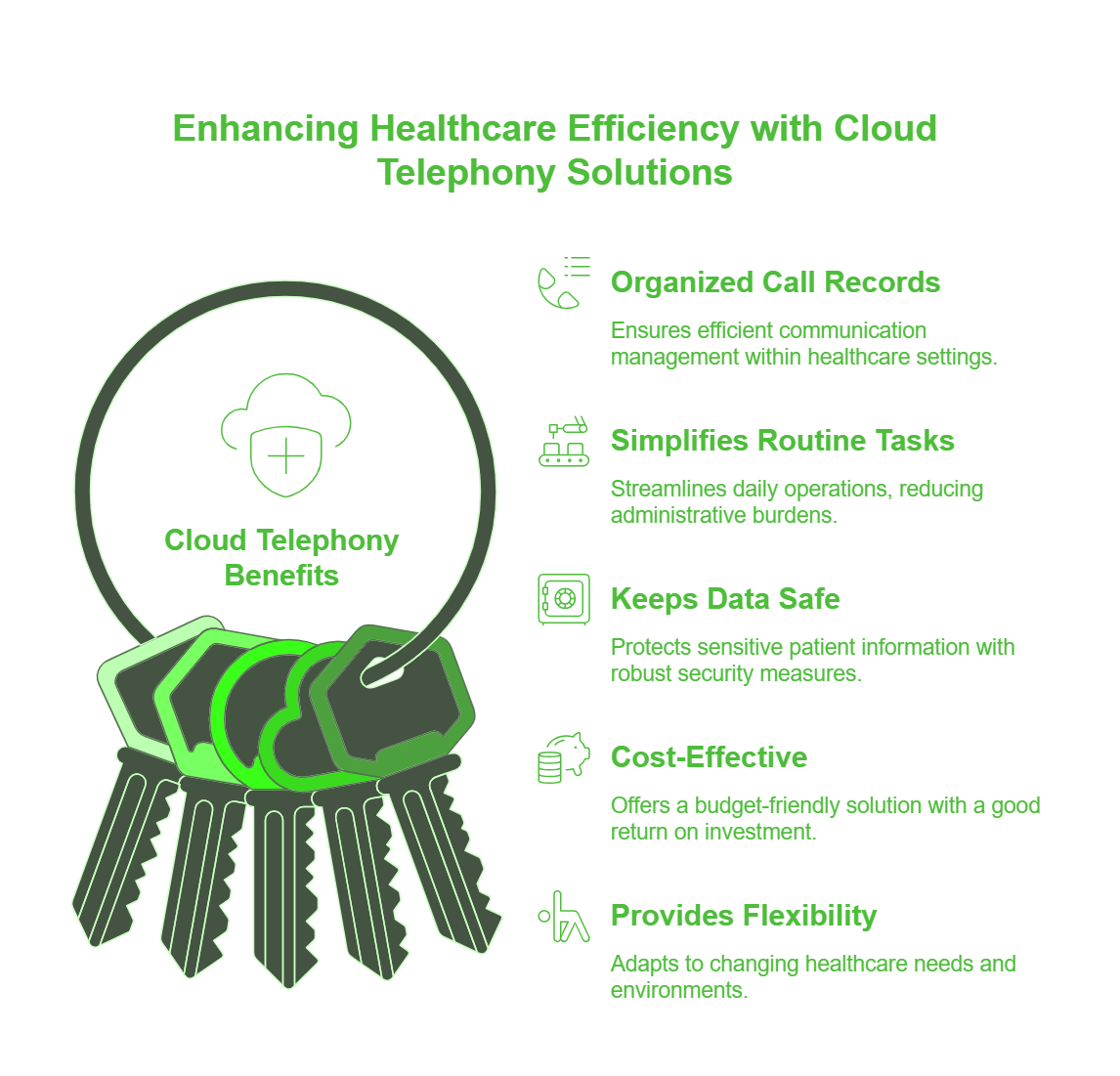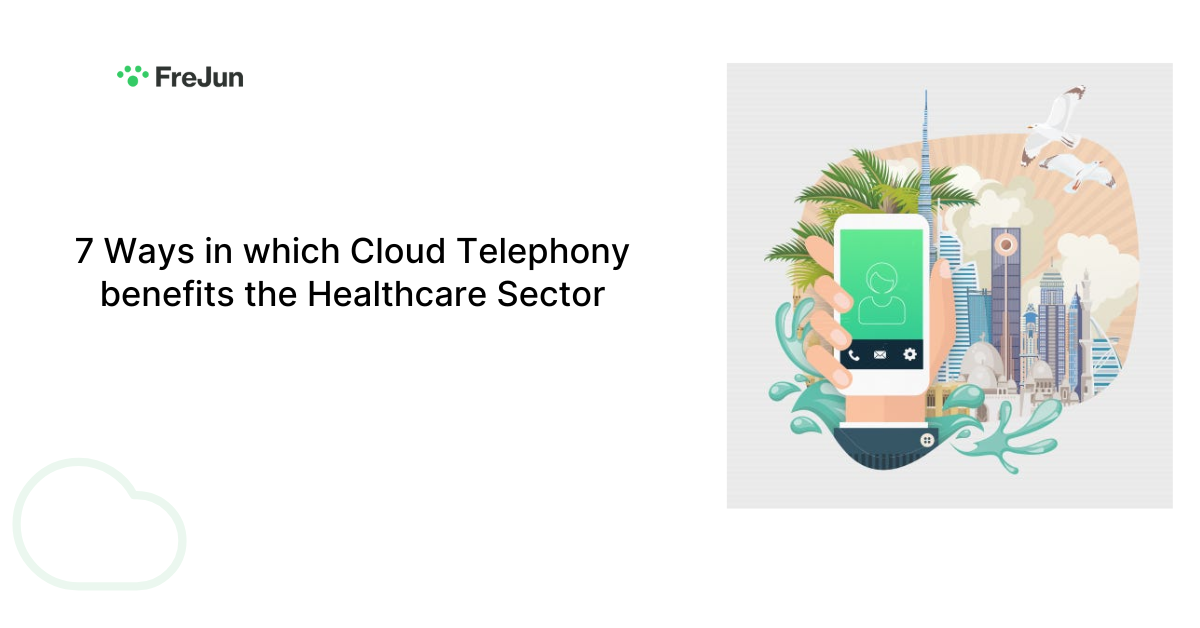Last updated on June 28th, 2025 at 05:36 pm
In 2025, the healthcare industry is undergoing a significant transformation, becoming more dynamic, patient-centric, and tech-driven. Effective communication systems are now crucial, especially as telemedicine and AI-powered diagnostics gain traction. This blog post explores how cloud telephony is revolutionizing healthcare, empowering providers to enhance patient care, streamline operations, and boost overall efficiency.
The healthcare industry is growing rapidly, and to compete and grow, many hospitals have started to move their business to the cloud. Cloud telephony benefits healthcare institutions by helping them provide medical assistance round-the-clock and much more.
Cloud telephony technology is witnessing a surge within the healthcare sector as it simplifies the communication process and makes it smooth & efficient. It has emerged as an effective replacement for the traditional landline calling system. Healthcare centers of all sizes are adopting this technology to streamline their calling system.
Table of contents
- Transforming Healthcare Communication: What is Cloud Telephony?
- Essential Features of Cloud Telephony in Healthcare
- Emergency Call Handling with Cloud Telephony
- Doctor’s Use of Cloud Telephony
- Solving Communication Challenges in Healthcare with Cloud Telephony
- 7 Key Benefits of Cloud Telephony for the Healthcare Sector
- Conclusion
- Frequently Asked Questions
Transforming Healthcare Communication: What is Cloud Telephony?
Cloud telephony refers to a type of communication system that uses the internet and cloud-based technology to make and receive phone calls. Instead of using traditional hardware-based phone systems, cloud telephony systems use virtual phone lines and software to handle calls.
With cloud telephony, businesses can make and receive calls using a variety of devices. This includes desktop computers, laptops, smartphones, and tablets. The best part about cloud telephony is that it enables employees to stay connected with themselves and reachable even when they are not in the office.
Essential Features of Cloud Telephony in Healthcare
| Feature | Function in Healthcare |
| IVR System | Automates patient queries |
| AI Call Routing | Directs emergency calls |
| Secure Encryption | Protects patient data |
| CRM Integration | Links patient records |
| Automated Alerts | Sends appointment reminders |
Emergency Call Handling with Cloud Telephony

Doctor’s Use of Cloud Telephony

Solving Communication Challenges in Healthcare with Cloud Telephony
In the healthcare industry, efficient and secure communication is not just important—it’s critical. Traditional phone systems often fall short, leading to issues that can affect both patient care and operational efficiency.
Common Communication Challenges in Healthcare:
- Missed or dropped calls from patients due to limited phone lines or outdated systems
- Long wait times and inefficient call routing, frustrating patients and staff
- Data privacy and compliance concerns when handling sensitive patient information
- Lack of call tracking or reporting, making it hard to optimize workflows
How Cloud Telephony Provides the Solution:
- Smart IVR & Call Routing: Automatically routes patients to the right department, reducing wait times
- Always-On Connectivity: Ensures no calls are missed—even during peak hours or staff shortages
- HIPAA & GDPR-Compliant Security: Encrypts communications and ensures safe handling of patient data
- Real-Time Analytics: Offers insights into call volumes, response times, and staff performance
- Scalable & Remote-Friendly: Supports virtual consultations and remote healthcare teams
7 Key Benefits of Cloud Telephony for the Healthcare Sector
These are the 7 Benefits of Cloud Telephony for the Healthcare Sector:

1. Organized Call Records
In 2025, patients demand seamless and instant communication with healthcare providers. Cloud telephony ensures 24/7 accessibility, enabling patients to contact hospitals, clinics, and telemedicine providers from anywhere.
Healthcare institutions receive thousands of calls every day with numerous queries. Managing all the calls can be time-consuming & tedious and lead to errors and misunderstandings. Cloud telephony helps in managing the calls effectively by streamlining the calling process. It helps in keeping track of all incoming and outgoing calls and notifying of missed calls. The staff can then follow up on the missed ones. It ensures that no call goes unattended and queries get answered on time. The hospitals can make calls using a virtual phone number that is easy to remember and track. It establishes a professional brand reputation and provides a good calling experience.
2. Simplifies Routine Tasks
Cloud telephony’s IVR feature helps in routing the calls to the right department within the healthcare institution. It eliminates the need for manual transfer of calls and makes it easier for the staff to manage them. It also ensures that the caller doesn’t have to wait for long and provides a smooth calling experience. The scheduling of appointments and routine check-ups can be automated using cloud telephony. They can schedule calls and appointments as per their availability and convenience. This feature sends out reminders to both the doctor and the patient of their upcoming appointments or any changes in the schedule. Hence, it saves time and avoids confusion and errors.
3. Keeps the Data Safe
Hospitals want their data to stay safe and secure as it contains highly confidential information. Technical disasters like software glitches, downtime issues, hardware malfunction, etc, can lead to data loss. Cloud telephony helps in overcoming such challenges. It stores all the data on the cloud; hence no data gets lost in a disaster and can be easily recovered. Therefore, it makes it easier for hospitals to manage huge volumes of data. Large hospitals can invest huge amounts in disaster recovery, but small hospitals need a solution that meets their needs without requiring a huge investment.
4. Cost-Effective
A cloud telephony setup does not require a huge investment and is easy to install and use. You can choose a subscription-based model depending on your budget and start using it. Moving your hospital management system to the cloud will help you cut down the capital expenditure and simplify the management.
5. Provides Flexibility
It helps you provide healthcare services remotely. Cloud telephony benefits doctors practicing remotely by helping them connect with patients from anywhere; all they require is a stable broadband connection. It makes medical services widely accessible and enhances the patient experience. The hospitals can use cloud-based telephony to provide medical assistance to patients over call and reduce crowds in hospitals. It can play a crucial role in this pandemic situation when it is advised to avoid crowding at places and help in reducing the infection rates.
6. Allows Easy Scalability
The healthcare sector is growing at a very fast pace. Therefore, it requires a robust yet flexible telephony system that makes scalability easier and hassle-free. Cloud telephony adapts to the changing needs of healthcare organizations and helps them scale up easily. In addition, it keeps the data safe during scaling up and prevents data loss.
7. Easy sharing of Data
Cloud telephony offers detailed call records which can be easily shared through a link, for review, or in case of any emergency. Since healthcare information is meant to stay confidential, cloud telephony helps share the data securely among all the relevant stakeholders. Apart from sharing, they can also remotely access the call records anytime, anywhere. Thus, moving your operations to the cloud helps you stay in touch with your organization 24/7 from any remote location.
“Ensure your clinic delivers seamless, patient-centric care. Start your 3-day Free Trial of FreJun Cloud Telephony today!
Conclusion
In 2025, the healthcare sector is leveraging technology to offer more personalized, accessible, and efficient care. Cloud telephony stands out as a vital tool, addressing the unique challenges of the industry. Its scalability, cost-efficiency, and ability to integrate with other digital systems make it indispensable for modern healthcare providers.
By adopting cloud telephony, healthcare organizations can ensure that they not only meet but exceed patient expectations, delivering care that is timely, efficient, and patient-focused.
Conclusion, Cloud telephony is more than just a communication tool—it’s a lifeline for modern healthcare in 2025. Whether it’s enabling telemedicine, automating patient interactions, or streamlining internal processes, its benefits are transforming the way care is delivered. For healthcare providers looking to stay ahead, adopting cloud telephony is no longer an option but a necessity.
If you are looking for an automation platform that provides you with multiple cloud telephony features to streamline your calling process, then FreJun is the right one for you. You can try FreJun for 7 days for free and see if it’s the right fit for your business.
Further Reading: What Is Cloud Telephony And How It Works | The Ultimate Guide
Frequently Asked Questions
Cloud telephony enables automated call routing and IVR systems that handle multiple patient calls simultaneously reducing wait times and ensuring urgent queries reach the right department quickly.
Yes! FreJun’s cloud telephony allows automated voice calls or SMS alerts for appointment confirmations, reminders, and follow-ups, reducing no-shows and improving patient management.
With features like virtual numbers and call forwarding, doctors can stay connected with patients securely without revealing personal numbers ensuring timely consultation even outside clinic hours.
Yes. FreJun prioritizes data privacy. All calls, logs, and recordings are encrypted and stored securely in compliance with healthcare data protection standards.
Absolutely. FreJun supports integrations with CRMs, enabling smoother workflows and centralized patient communication records.
Yes. FreJun offers call recording features, which can be used (with consent) for quality assurance, legal compliance, or reference during follow-up consultations.
Definitely. By eliminating the need for expensive PBX systems and enabling internet-based calling, cloud telephony significantly cuts down communication expenses.
Cloud telephony offers businesses greater flexibility, scalability, and cost-efficiency by eliminating the need for physical phone infrastructure. With solutions like FreJun, teams can make and receive calls from anywhere, access real-time call analytics, automate call logs, and integrate seamlessly with CRMs—boosting productivity and streamlining communication.
